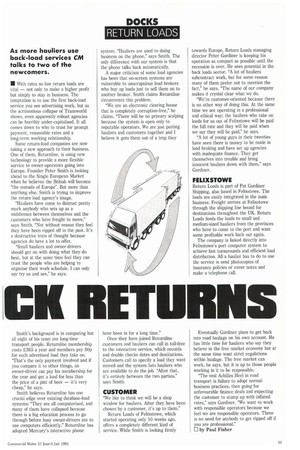As more hauliers use back-load services CM talks to two of the newcomers.
Page 37

If you've noticed an error in this article please click here to report it so we can fix it.
• With rates so low return loads are vital — not only to make a higher profit but simply to stay in business. The temptation is to use the first back-load service you see advertising work, but as the acrimonious collapse of Transworld shows, even apparently robust agencies can be horribly under-capitalised. It all comes down to who to trust for prompt payment, reasonable rates and a long-term working relationship.
Some return-load companies are now taking a new approach to their business. One of them, Returnline, is using new technology to provide a more flexible service to owner-operators going into Europe. Founder Peter Smith is looking ahead to the Single European Market when he believes the British will become "the nomads of Europe". But more than anything else, Smith is trying to improve the return load agency's image.
"Hauliers have come to distrust pretty much anybody who sets up as a middleman between themselves and the customers who have freight to move," says Smith. "Not without reason they feel they have been ripped off in the past. It's a destructive train of thought because agencies do have a lot to offer.
"Small hauliers and owner-drivers should get on with doing what they.do best, but at the same time feel they can trust the people who are helping to organise their work schedule. I can only say try us and see," he says.
Smith's background is in computing but all eight of his team are long-time transport people. Returnline membership costs £365 a year and members pay 50p for each advertised load they take on. "That's the only payment involved and if you compare it to other things, an owner-driver can pay his membership for the year and get a load for less than the price of a pint of beer — it's very cheap," he says.
Smith believes Returnline has one crucial edge over existing database-load systems: "They are all computerised, and many of them have collapsed because there is a big education process to go through before busy owner-drivers are to use computers efficiently." Returnline has adopted Mercury's interactive phone system, "Hauliers are used to doing business on the phone," says Smith. The only difference with our system is that the phone talks back automatically.
A major criticism of some load agencies has been that on-screen systems are vulnerable to unscrupulous load brokers who buy up loads just to sell them on to another broker. Smith claims Returnline circumvents this problem.
"We are an electronic clearing house that is completely corruption-free," he claims. "There will be no primary scalping because the system is open only to reputable operators. We are just putting hauliers and customers together and I believe it gets them out of a trap they have been in for a long time."
Once they have joined Returnline customers and hauliers can call in toll-free to the interactive service, which records and double checks dates and destinations. Customers call to specify a load they want moved and the system lists hauliers who are available to do the job. "After that, it's entirely between the two parties," says Smith.
CUSTOMER
"We like to think we will be a shop window for hauliers. After they have been chosen by a customer, it's up to them."
Return Loads of Felixstowe, which started operating only 10 weeks ago, offers a completely different kind of service. While Smith is looking firmly towards Europe, Return Loads managing director Peter Gardiner is keeping his operation as compact as possible until the recession is over. He sees potential in the back loads sector. "A lot of hauliers subcontract work, but for some reason many of them prefer not to mention the fact," he says. "The name of our company makes it crystal clear what we do.
"We're customer-oriented because there is no other way of doing this. At the same time we are operating in a professional and ethical way: the hauliers who take on loads for us out of Felixstowe will be paid the full rate and they will he paid when we say they will be paid," he says.
"A lot of young guys in their twenties have seen there is money to be made in load broking and have set up agencies with inadequate finance. They get themselves into trouble and bring innocent hauliers down with them," says Gardiner.
FELIXSTOWE
Return Loads is part of Pat Gardiner Shipping, also based in Felixstowe. The loads are easily integrated in the main business. Freight arrives at Felixstowe through the shipping line bound for destinations throughout the UK. Return Loads feeds the loads to small and medium-sized hauliers from the provinces who have to come to the port and want some profitable work back out again.
The company is linked directly into Felixstowe's port computer system to achieve fast turnarounds and efficient load distribution. All a haulier has to do to use the service is send photocopies of insurance policies or cover notes and make a telephone call.
Eventually Gardiner plans to get back into road haulage on his own account. He has little time for hauliers who say they believe in the free market economy but at the same time want strict regulations within haulage. The free market can work, he says, but it is up to those people working in it to be responsible.
"The real Achilles Heel in road transport is failure to adopt normal business practices, then going for unfavourable finance deals and expecting the customer to stump up with inflated rates," says Gardiner. "We want to work with responsible operators because we feel we are responsible operators. There is no need for anybody to get ripped off if you are professional."
D by Paul Fisher












































































































